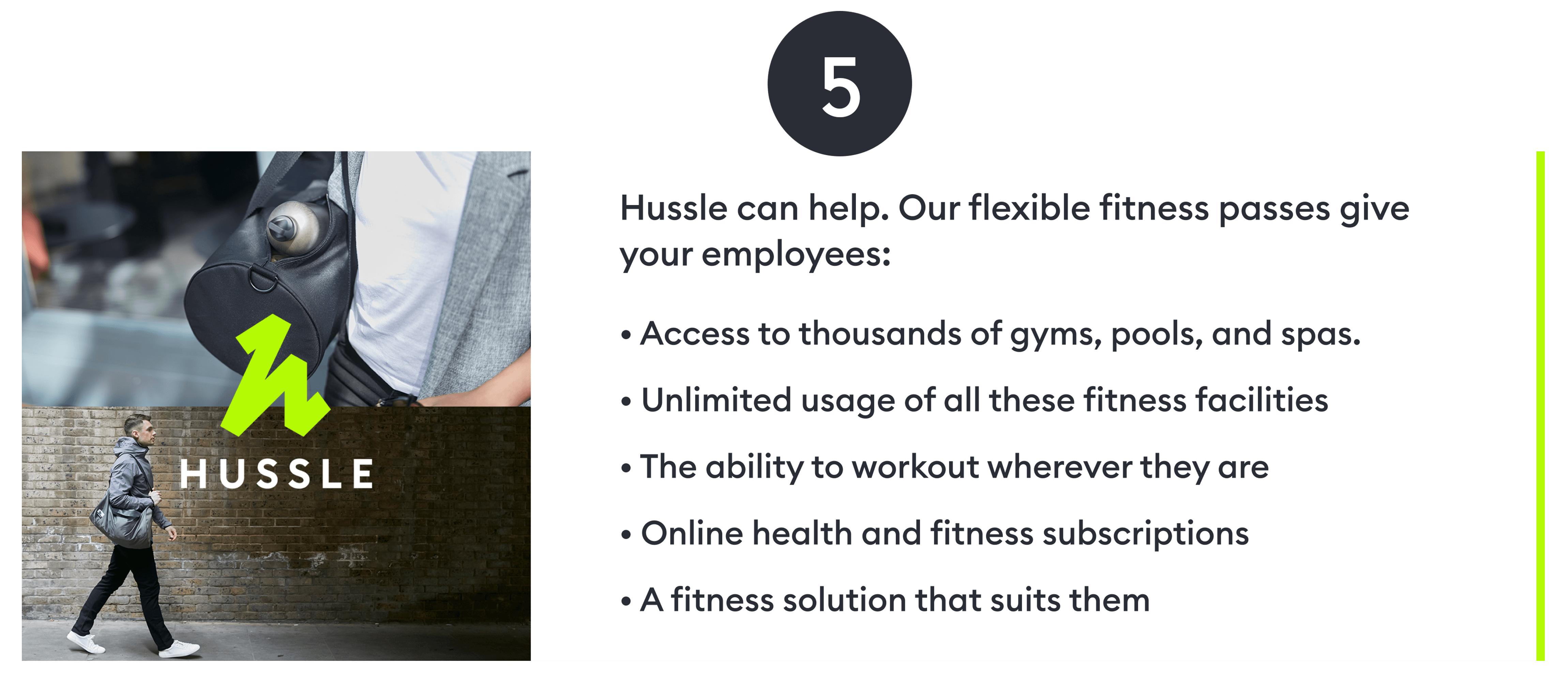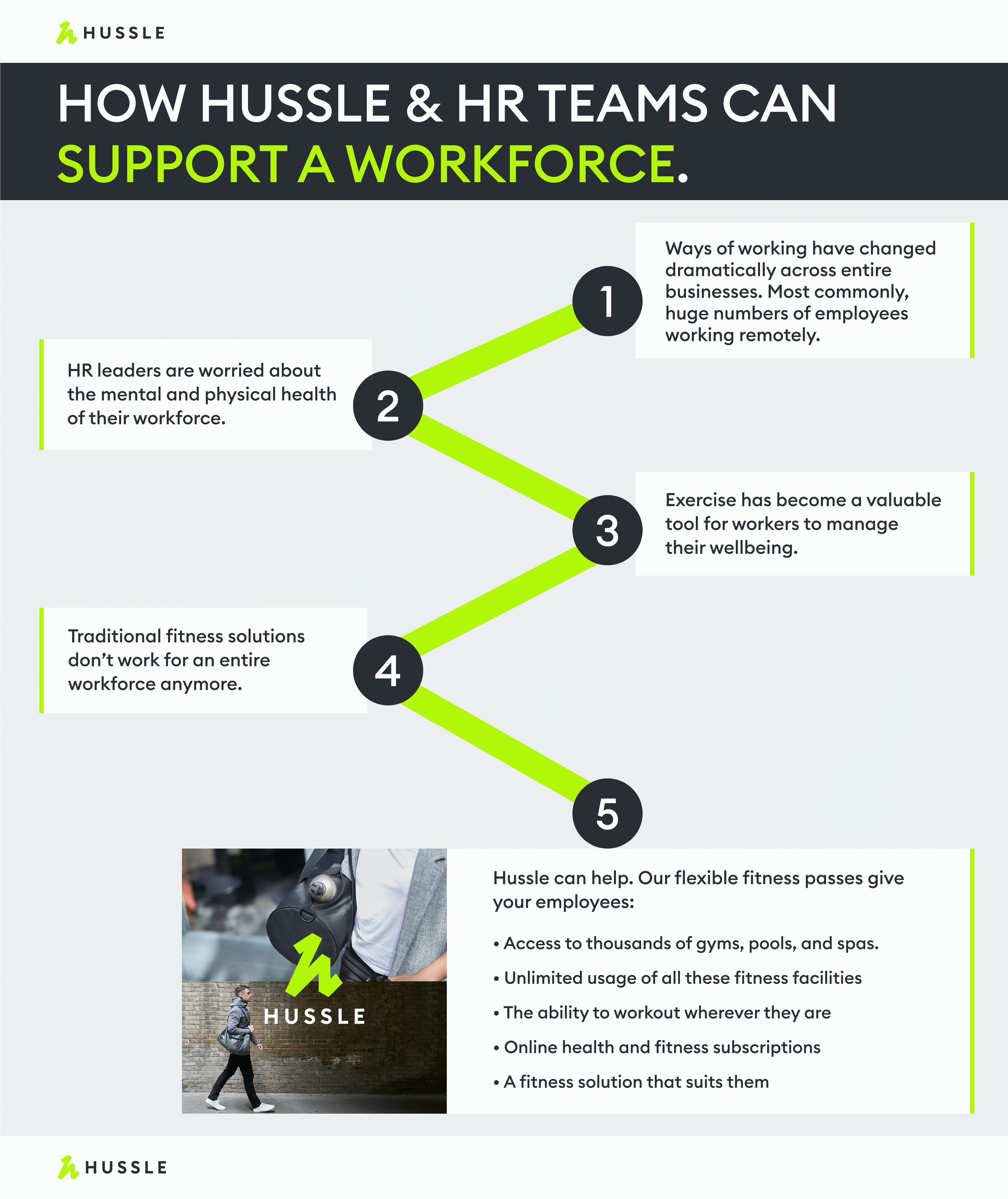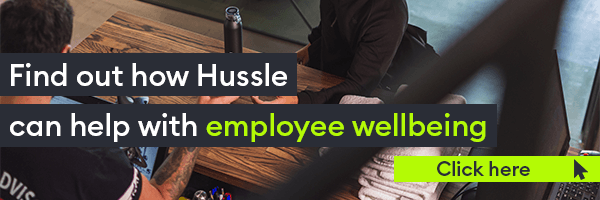Work life has been impacted by COVID in a huge range of ways. Working from home, furlough, pay cuts, government guidelines, operational changes, increases in workload, role shifts, up-skilling. And that’s not an exhaustive list. We’ve all had to digest and adapt to the way we’ve been individually affected.
Except HR. HR teams have had to think about how every single employee across the company has been affected. And deal immediately with unforeseen impacts on their workplace and wellbeing. The challenge is a big one. Up to 70% of HR leaders are worried about their teams mental and physical health and feel there isn’t a COVID-proof solution to help them support their workforce.
The most en masse change for UK adults is having to work from home. In September, research showed 40% of UK adults in employment were still working remotely, with 60% of those doing so until at least next year.

When employees will return to the office is stamped with a big question mark. Fifty of the biggest UK employers asked by BBC said they have no plans to return in the near future. In a recent announcement, Twitter said their employees will have the option to work from home forever.
Zach Berwick, our Partnerships Manager, has been chatting with HR teams from around the UK about how COVID has impacted the way they manage their workforce.
“When I ask HR reps from across the UK when their workforce will be returning to the office, the answer is the same. They have absolutely no idea. There is no indication that it will be happening any time soon.”
Zach’s been finding out what the challenges and solutions are for HR reps looking to support a workforce that they can now only communicate with online.
“Over the past ten years, ways of working between businesses has gradually been brought online. COVID has meant that ways of working within a business are now being digitised too. The relationship between employer and employee now needs to exist through the internet and that’s something we’ve had to get used to immediately.”
In March, the focus was on making sure everybody had what they needed to do their jobs. The right tech, internet access, and an ergonomic chair for the lucky ones. Now, the focus is on the long-term adaptations we all need to make. There are business focuses on re-skilling, changing management competencies, building a culture of trust, and the all-important buzzword of employee wellbeing.
Increasing productivity, reducing absenteeism, and improving employee retention are all reasons HR teams implement wellbeing initiatives across a business. But right now, that’s a bit tricky.
Zach shares his insight that “The biggest challenge cited by the HR teams is that it’s so much harder to understand the needs of a remote workforce. When asked about their biggest challenges at present, more than 70% of HR professionals responded that the health and wellbeing of employees was a major concern.”
Ensuring employee wellbeing means promoting and enabling the right behaviours. Usually, that would come in the form of talks, events, and office-based benefits that everyone could enjoy. Of course, all of that is now impossible.
Wellbeing has always been important, but this year, it’s even more so. Unsurprisingly, COVID-19 has exacerbated an already declining state of workplace wellbeing. Around 4 in 10 workers report that their mental and physical health has worsened since the pandemic.
General physical health is hard to attribute. More sedentary routines, poorer diets, and increased alcohol consumption could all be factors.
Mental health is more obvious, as we’ve all experienced the stress brought on by this year’s events. CIPD reports that 61% of people said the pandemic had contributed towards anxiety. And of those with existing mental health issues, 56% said they had worsened since March. The Office for National Statistics found that the rate of depression in adults had doubled at the 3-month mark from the start of lockdown.
It’s not a positive picture, so we’ll quickly move on to a solution focused look at the ways HR can help.

Giving employees access to fitness has always helped to increase employee wellbeing but over the past few months, it’s become even more important to people. A Nuffield Health survey reported that 76% of people took up a new form of exercise during lockdown and 81% of them wanted to continue with it. It also found that 75% of respondents said exercise had helped them cope mentally with the disruptive impact on their day-to-day lives.
“Exercise offers an immediate routine to individuals who might have recently lost structure in their working day. As the barriers between time work time and personal time have broken down, making time for fitness is the easiest way employees can refresh the body and mind”, Zach recalls.
“After that, the effects keep going. Endorphins are released which help reduce stress, lift mood, and increase energy. In the longer term, the physical changes on the body help improve energy, posture, and muscular function. All this means better overall health.”
But the challenge is fitting exercise in against differing and demanding lifestyles. It’s not just the work/life balance. It’s the work/life/fitness balance. As the line between work and personal time starts to blur for lots of employees across the UK, striking this balance is becoming even harder.
A year ago, popular work perks included an onsite gym or a fitness facility near the office. But the shift in circumstance means those aren’t helpful solutions anymore.
“Last summer, onsite gyms, 12-month memberships, and gym discounts to a venue nearby were the go-to options for HR to incentivise employees to exercise. None of those options make sense anymore,” Zach reminds us.
Employees need a fitness solution that suits them, their routines, their locations, and their version of fitness. A blanket approach to physical wellbeing isn’t going to suit an entire workforce. It’s got to be bespoke in order to help everyone strike that work/life/fitness balance.
This is exactly where Hussle can help.

We pride ourselves in helping everyday folk fit fitness in. We want to give them a fitness solution that doesn’t involve 6am starts, 6-month commitments, or a 60-minute bus journey. If we can make our customer’s lifestyles a little bit easier, that’s a job well done in our eyes.
If you haven’t heard of us already, Hussle offer flexible fitness passes that let you access thousands of different gyms from our fitness community. Some have pools, and even spas. From your local independent studio, to your favourite nationwide chain. We bring all these places together and give you a pass that lets you go to any of them.
Plus, some of our passes also include health and fitness subscriptions. That means you get on-demand classes, programs, and tracking. If the WOFH (working out from home) sometimes suits, then there’s an option for that too.
Our corporate offering is there to give HR teams a wellbeing benefit that suits the individual needs of all their employees with one simple solution. Our flexible fitness passes mean that your business can give its workforce the ability to access fitness wherever and however they like. So, they can work out in their own way.
Our basic, standard, deluxe and premium passes come at a range of prices meaning there’s an option for everyone.
On his experience working with HR teams in recent months, Zach concludes that “The feedback so far on our corporate offering has made being part of Hussle really rewarding. Empowering HR teams by offering them a wellbeing initiative that works for both remote and onsite employees is exactly what we set out to do.”
To find out how Hussle can help your HR teams become the heroes of this new way of working, get in touch with us at corporatefitness@hussle.com



